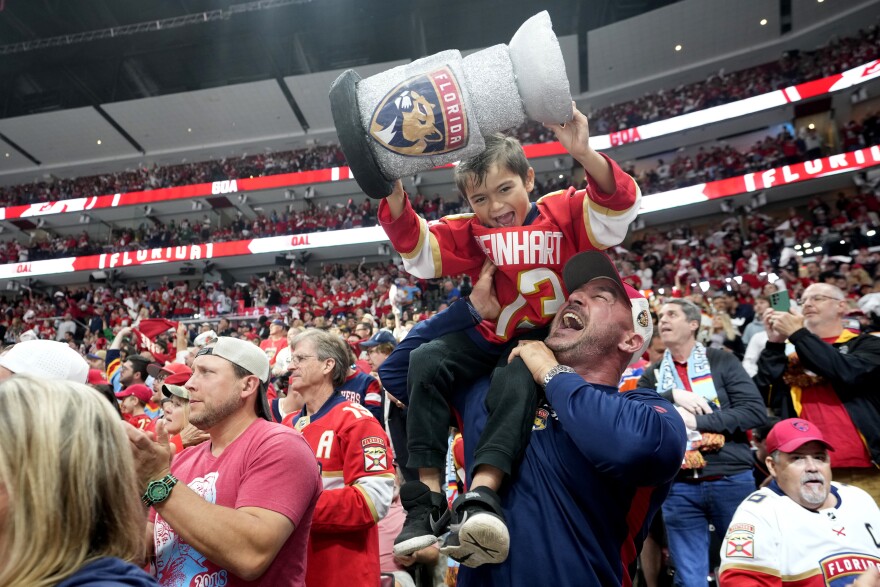The spark in Leo Jungerman's eyes when he watched his first hockey game was different.
He'd tried other sports like soccer and tennis, his father Alex said. But a hockey game featuring the Toronto Marlies — the Toronto Maple Leafs' minor league team — is where an 8-year-old Leo's love truly began for the sport.
“When we were watching the game, I spent a big chunk of the time looking at him,” Alex Jungerman said, "and it was kind of fascinating. So when he expressed interest in trying the game, I jumped right in.”
Alex, who had moved his family from Brazil to Florida that year in 2015, started looking for youth hockey programs for Leo, who knew nothing about hockey and couldn't even skate.
That's when he came across the Florida Panthers Learn to Play initiative — a program designed to introduce boys and girls to hockey while reducing barriers to entry for the sport. It's part of the Panthers' overall effort to grow the game in untapped communities, particularly the rapidly growing Hispanic market.
READ MORE: Florida Panthers seek to clinch Stanley Cup Final after Game 3 win
Almost 30% of Floridians are Latino, according to the U.S. Census Bureau, higher than the national average of about 19%. There are more than 500,000 Hispanic residents in Broward County, Florida, where the Panthers' Amerant Bank Arena is located. That number increases to more than 1.7 million in neighboring Miami-Dade, Florida's most populous county.
“The demographic makeup in Florida certainly expresses an interest that it’s extremely important to connect to the Latino community,” said Rob Knesaurek, the NHL’s senior vice president of community development and industry growth. “They’re deeply rooted in sports. Why wouldn’t they pick our sport?"
Knesaurek added the NHL is more intentional in popularizing the sport in Latino communities, where the league hasn't been traditionally proactive. That started with league-wide efforts to connect with Hispanic fans as well as those in underserved communities, and it trickles down to grassroots initiatives by individual teams.
The NHL and NHL Player's Association's industry growth fund has spent more than $180 million over the past decade on programs that bring hockey to communities across North America. It focuses largely on combating the barriers of access and cost.
Through the fund, many clubs can offer a fixed, affordable amount for equipment and lessons — some offer them for free — and coaches who speak both Spanish and English.
Alex Jungerman estimated he spent around $300 for the Panthers' Learn to Play program. Leo got full equipment, including skates and six lessons, to start his hockey journey.

Instructors could translate hockey lingo to the Jungermans. Leo said the Panthers made him feel welcomed, especially in moments when learning hockey felt scary.
“There were several times I wanted to quit, especially because of the skating,” Leo said, “like you’re balancing your whole body weight on two little edges. It’s hard to learn.”
He stuck with it. Now at 16, he's on Florida's Junior Panthers travel hockey team.
“Leo’s just a perfect example of a family that could have easily walked away from this if they didn’t feel welcomed or part of this,” said John Colombo, the Panthers’ vice president of community relations. “And I think that’s important. I think too often hockey culture gets that reputation of being very exclusive.”
Overall, the NHL said over $4 million in industry growth fund grants have been given to support the Panthers' initiatives to grow the game.
The team's floorball PE program has reached over 300,000 students across 450 schools in Florida — introducing kids to the sport and the Panthers' brand with the goal of creating lifelong fans.
The Panthers during the season hold a “¡Vamos Gatos!” night, which celebrates South Florida's Hispanic and Latino community. They've hosted the LATAM Cup — a three-day tournament featuring Latin American and Caribbean countries — since its inception in 2018. And they've also expanded into the entertainment arena, inviting more Hispanic and Latino artists to perform at Amerant Bank Arena. The arena hosted the Latin Billboard Music Awards in 2020 and Latin American Music Awards in 2021.
“(We) are not looking for the next NHLer,” Knesaurek said. “What we are looking for is to build good, healthy, vibrant communities through good citizens.”

The Panthers recent success on the ice has certainly helped with their popularity. Florida has a 3-1 lead over the Edmonton Oilers in the Stanley Cup Final, which the Panthers are competing in for the second straight year.
“The popularity of the sport and how the team has progressed over the last three or four years, I think you’re going to see an uptick," said Bryan Smolinski, a former NHL player and regional director with the league's industry growth fund.
Hispanic and Latino participation in Florida's Learn to Play program increased 15% from 2023 to 2024.
Leo Jungerman was featured on the team's first Learn to Play poster from 2015. The Jungermans have that poster displayed at the entrance of their home as a reminder of how far he's come.
“We make sure that everyone that comes to the house for the first time, we stop them from in front of the poster. We explain the story,” Alex Jungerman said. “We are really proud.”
Copyright 2024 WLRN Public Media



